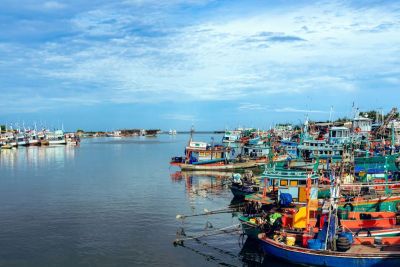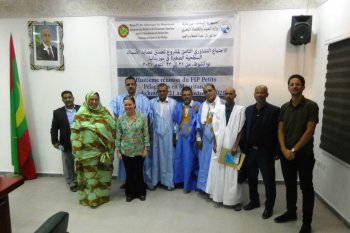The FIP was set up as a partnership between the Mauritanian fishery authority, the Mauritanian oceanographic and fisheries research institute (IMROP), local businesses, and international fishmeal and fish oil buyers.
Contents
- Market drivers
- Mauritania Small Pelagic Fishery FIP
- FIP Process
- Sustainability of fishery
- Social aspects
- Development of the industry
- Steps and controls taken so far
- Looking forward
- Social plan
Market drivers
 International pressure to improve and verify the sustainability of fisheries that are used for marine ingredient production, has led to a rise in the number of Fisheries Improvement Projects (FIP) being initiated around the globe over the past decade or so, and also to the number of FIPs applying to join the MarinTrust Improver Programme (IP). The MarinTrust IP provides recognition for marine ingredient producers sourcing from a FIP fishery, and encourages fisheries sourcing to marine ingredient producers not yet meeting the conditions for the MarinTrust Standard, to implement improvements to achieve the necessary criteria.
International pressure to improve and verify the sustainability of fisheries that are used for marine ingredient production, has led to a rise in the number of Fisheries Improvement Projects (FIP) being initiated around the globe over the past decade or so, and also to the number of FIPs applying to join the MarinTrust Improver Programme (IP). The MarinTrust IP provides recognition for marine ingredient producers sourcing from a FIP fishery, and encourages fisheries sourcing to marine ingredient producers not yet meeting the conditions for the MarinTrust Standard, to implement improvements to achieve the necessary criteria.
“In short, our robust Improver Programme together with the MarinTrust Standards provide assurances to buyers and their buyers that the raw material entering the supply chain is fully traceable from the fishery.” Dr Nicola Clark, MarinTrust Impacts Manager.
Mauritania Small Pelagic Fishery FIP
One fishery participating in a FIP and accepted into the MarinTrust IP is the Mauritanian small pelagic fishery, which is targeted by artisanal and coastal purse seine and pelagic trawl vessels. The main species are Round Sardinella* ( Sardinella aurita), Cunene horse mackerel ( Trachurus trecae ), Flat Sardinella (S. maderensis) , Chub mackerel (S. japonicus), European Pilchard (S. pilchardus) and Atlantic Horse Mackerel (T. trachurus).
The FIP was set up as a partnership between the Mauritanian fishery authority, the Mauritanian oceanographic and fisheries research institute (IMROP), local businesses, and international fishmeal and fish oil buyers, including the Olvea Group, which was instrumental in initiating the process.
Expertise and assistance have also been received from the Sustainable Fisheries Partnership (SFP), which works with fisheries stakeholders and seafood companies to reduce the environmental and social impacts of fishing and fish farming, and to rebuild depleted fish stocks.
FIP Process

In 2018, at the start of the FIP, the fishery was assessed against the MarinTrust Standard, and in 2021, against the MSC Standard. Both MSC and MarinTrust Standards follow the same approaches for stock status, resource management strategy, control and monitoring, impact on protected species and the environment, and governance. The assessments provided valuable benchmarking information to help inform a management and work plan to start the small pelagic fishery on its journey towards sustainability. The FIP was accepted into the MarinTrust Improver Programme in October 2019 following the assessments, and progress is being monitored.
One of the main priorities for the Mauritania small pelagic fishery FIP is to improve the collection of fisheries data by IMROP, which will enable changes in the status of the target stocks to be effectively monitored.
“The target stocks are shared with neighbouring countries including Senegal, Morocco and Gambia, which can make it difficult to manage the fishery, so we need to strengthen government and scientific collaboration with these countries.” Dr Jo Gascoigne, International FIP Coordinator.
Sustainability of fishery
Other measures include supporting the Mauritanian government to work towards robust management and long-term sustainability of the fishery, as well as improving the value return by refocusing the catch towards the human consumption market. Such a move will also strengthen food security. To ensure maximum value can be obtained from the resource, waste products from processing will be directed to the FMFO market.
Social aspects
The social component of the FIP is part of the Fishery Progress requirements. It is also very important because the fishery provides jobs and livelihoods for many local people, both at sea and on land. Vessels are to be encouraged to sign a Fishery Progress social charter in 2022 (Fisheryprogress.org), and the fishery will be subject to an independent social audit, which will verify that seafarers’ rights are not compromised.
Development of the industry
The Mauritanian fishmeal industry is only a decade or so old and many different nationalities have established factories there and brought in foreign vessels to catch the fish. As a result, the pressure on the stocks has increased considerably, leading to overexploitation. The government has now acknowledged that the situation cannot continue, that something has to be done, and is introducing management measures to tackle the issue and police the fishery, but solving it is not an easy task. At its peak, between 2018-2020, with vessels fishing hard, there were annual landings of more than 1 million tonnes of small pelagic fish; 80% of this was turned into marine ingredients for animal feed, with the majority of fishmeal destined for China and Vietnam, and the fish oil for Europe.
Steps and controls taken so far
Vessels are registered with an official number.
Authorizations are given to land in the Nouadhibou port
Controls by the local authorities at landing:
- Coast guards (vessel documentation, fish species, fishing zones, respect of the quotas, etc.)
- ONISPA sanitary inspection (decision of fish destination: human consumption, freezing units, or FMFOs). An official paper is delivered indicating that the control has been done and to which factory the fish can go to.
- IMROP samples (not systematic) are taken to collect data on catches in order to evaluate the fish stocks and the sustainability
- Other controls by the Coast guards at arrival in the factories (documentation, authorizations, fish species, etc.).
According to the decision of ONISPA, the fish can be sent to the freezing unit, or some may be used in fishmeal fish oil production (by-products, improper fishes, quotas, etc.)
There are quotas for the small pelagics in Mauritania (starting in 2018) to better target the human consumption market and avoid overfishing. According to this regulation, all factories must have a freezing unit in order to run a fishmeal fish oil production. Otherwise they are limited to 4,000 tons of fish.
100% of sardinellas goes to the freezing units. No sardinella can go directly to the fishmeal production, this is not allowed.
- 30% of the sardines are sent to the freezing units and 70% can go to the fishmeal production.
- Fish that are not fit for human consumption (after verification of ONISPA) can go to the fishmeal production.
On top of these regulations, the SNDP (Société Nationale de Distribution de Poisson) was created in Mauritania to distribute free fish to the most vulnerable population. This company is supplied by the fishing boats, which give it 2% of their catches.
Looking forward
Mauritania is now looking to Morocco as an example of good practice, where the fish value chain extends from canned and frozen fish to marine ingredients. Local authorities have considerably reinforced the controls at landing, sorting, before and after processing to ensure that the quotas are respected and that the relevant fishes go to the human consumption market.
Since the implementation of the recommendations of the development plan in 2023, a new segmentation of coastal vessels has been applied. As a result, the presence of boats in the Mauritanian zone at the beginning of 2023 was limited compared to previous years. The quantity of fishmeal produced in 2023 reached approximately 71,370 tons with an oil quantity of around 17,645 tons.

“The round sardinella has been heavily exploited in the past, leading, among other things, to a critical situation of its stock both in Mauritania and at the sub-regional level. We have recorded a significant improvement in catches of this species in 2022 and 2023, with the presence of young breeding sizes ranging from 25 to 29 cm. The same cohorts of flat sardinella are observed during the sampling of catches in 2023” (FIP newsletter, January-March 2024).
In its 2024 report, the FAO's CECAF working group on the assessment of small pelagic fish off Northwest Africa sets out some recommendations based on the latest stock assessment, according to which five out of nine small pelagic stocks - sardine (in Area C), round sardinella, flat sardinella, Atlantic horse mackerel and ethmalose (bonga) - are overexploited. Recommendations include an immediate reduction in fishing effort of 60% for round and flat sardinella; the continuation of the ban on the use of sardinella for the production of fish oil and fishmeal; the implementation of biological rest, zoning, the setting of minimum sizes and capacity management.
Social plan
A social project was initiated early 2024 by experts from Partner Africa and IMROP, based on recent requirements for FIPs by FisheryProgress. The Human Rights Impact Assessment conducted by Partner Africa, funded by the Global Roundtable on Marine Ingredients, identified certain weaknesses in the social framework of the fishmeal/oil industry. The FIP received a grant from the Sustainable Fisheries Fund (SFF) to develop an action plan to address these issues.
The planned timeline for this task is as follows:
Phase 1 - 'Scoping' (list of elements to include in the plan, derived from the Partner Africa audit); Partner Africa responsible.
Phase 2 - Stakeholder consultation
Phase 3 - Draft and final action plan
Scope of the plan: FIP purse seiners and FIP factories.
“In the long term, once improvements have been fully implemented, the fishery may submit an application for the Marine Stewardship Council (MSC) and / or for approval via the MarinTrust programme. Indeed, MarinTrust is not a certification programme for fisheries, its unit of certification is the fishmeal / fish oil factory, but assesses the fisheries sourcing into the marine ingredient supply chains against the FAO conduct for responsible fisheries (MarinTrust also formerly recognises the MSC certification). MarinTrust certification in turn, opens the door to the global marketplace, which demands full traceability and accountability along the value chain.” Dr Nicola Clark, MarinTrust Impacts Manager.
More information on the Mauritania FIP is available here
Footnote: *Round sardinella is not permitted to be used in Mauritania as whole fish for Fishmeal production, however it is caught in the fishery and needs to be managed. Therefore it is important for it to be included in the scope of the Fishery Improvement Project work. This species is not permitted to be included in the scope of the MarinTrust Improver Programme factory audits.
